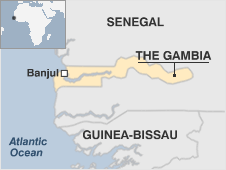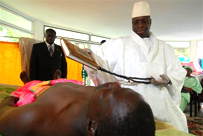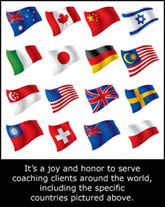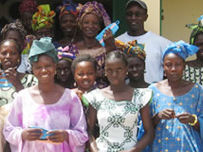 Country profile: The Gambia
Country profile: The Gambia
 The Gambia is a small West African country with a population of approximately 900,000. With more than half of the 48 physicians registered in 1989 in the public sector working in the country's main hospital, nurses are responsible for most drug prescribing in the public health care system. At the primary care level, village health workers, most of whom are illiterate, are trained to prescribe a limited number of drugs. Numerous difficulties in this field prompted the Gambia to request assistance from the World Health Organization's Drug Action Program in reviewing the pharmaceutical sector and formulating a national drug policy. The Essential Drugs Program was introduced in 1984 with the main objectives of achieving regulatory control over drugs in the private sector and the availability of safe, effective, and affordable drugs in the public sector. Assessment of the impact and progress of the program indicate that the essential drugs concept in the country has helped resolve some serious problems.
The Gambia is a small West African country with a population of approximately 900,000. With more than half of the 48 physicians registered in 1989 in the public sector working in the country's main hospital, nurses are responsible for most drug prescribing in the public health care system. At the primary care level, village health workers, most of whom are illiterate, are trained to prescribe a limited number of drugs. Numerous difficulties in this field prompted the Gambia to request assistance from the World Health Organization's Drug Action Program in reviewing the pharmaceutical sector and formulating a national drug policy. The Essential Drugs Program was introduced in 1984 with the main objectives of achieving regulatory control over drugs in the private sector and the availability of safe, effective, and affordable drugs in the public sector. Assessment of the impact and progress of the program indicate that the essential drugs concept in the country has helped resolve some serious problems.
The Gambia is one of Africa's smallest countries and unlike many of its West African neighbours it has enjoyed long spells of stability since independence.

President Yahya Jammeh seized power in a bloodless coup in 1994 and has ruled with an iron fist ever since.
Stability has not translated into prosperity. Despite the presence of the Gambia river, which runs through the middle of the country, only one-sixth of the land is arable and poor soil quality has led to the predominance of one crop - peanuts.
Overview
This has made The Gambia heavily dependent on peanut exports - and a hostage to fluctuations in the production and world prices of the crop.
 |
AT-A-GLANCE
Politics: Gambia has been relatively stable under the iron-fisted rule of Yahya Jammeh, who came to power in a bloodless coup in 1994
Economy: One of Africa's smallest countries has few natural resources and is highly dependent on peanut exports
International: Gambia separates northern Senegal from the southern Casamance province; a dispute over ferry tariffs led to a border blockade in 2005
|
Consequently, the country relies on foreign aid to fill gaps in its balance of payments.
President Jammeh wants to turn The Gambia into an oil-producing state. He says this could usher in a "new future". However, the country has yet to strike crude oil.
Tourism is an important source of foreign exchange, as is the money sent home by Gambians living abroad. Most visitors are drawn to the resorts that occupy a stretch of the Atlantic coast.
In 1994 The Gambia's elected government was toppled in a military coup. The country returned to constitutional rule two years later when its military leader ran as a civilian and won a presidential election. But the credibility of the poll was questioned by a group of Commonwealth ministers.
Facts
- Full name: Republic of The Gambia
- Population: 1.7 million (UN, 2009)
- Capital: Banjul
- Area: 11,295 sq km (4,361 sq miles)
- Major languages: English (official), Mandinka, Wolof, Fula
- Major religions: Islam, Christianity
- Life expectancy: 54 years (men), 57 years (women) (UN)
- Monetary unit: 1 dalasi = 100 butut
- Main exports: Peanuts and peanut products, fish, cotton lint, palm kernels
- GNI per capita: US $390 (World Bank, 2008)
- Internet domain: .gm
- International dialling code: +220
Leaders
President: Yahya Jammeh
Yahya Jammeh seized power in 1994 as a young army lieutenant and has won three widely criticised multi-party elections since then.

President Jammeh (r) administering his alleged herbal HIV cure to a patient
|
He won his third five-year term in September 2006 with more than two-thirds of the votes cast. His main rival, Oussainou Darboe, rejected the result, saying there had been widespread intimidation by local chiefs, governors and members of the security forces.
Commonwealth observers said overt support for Jammeh from public officials during the run-up to the vote may have given him an unfair advantage.
Mr Jammeh raised eyebrows early in 2007 when he claimed that he can cure AIDS. His cure involves a green herbal paste, a bitter yellow liquid and eating bananas and he says his methods produce positive results within days.
The country representative of the United Nations development programme in The Gambia, Fadzai Gwaradzimba, was told to leave the country after she expressed doubts about the president's claims and said the remedy might encourage risky behaviour.
Mr Jammeh's government has been criticised by international rights groups for its attitude to civil liberties, especially freedom of the press.
Reporters Without Borders (RSF) says there is "absolute intolerance of any form of criticism" in Gambia, with death threats, surveillance and arbitrary night-time arrests the daily lot of journalists "who do not sing the government's praises".
Many Gambians privately disapprove of the iron-fisted nature of his rule, which has seen political opponents and journalists imprisoned without charge, but say he has done much to improve schools, hospitals and roads.
Born in 1965, Yahya Jammeh joined the army in 1984 upon leaving school. He came to power in 1994 when a bloodless military coup ousted the elected president, Dawda Jawara, who had led the country since independence.
Upon taking power he set up bodies to investigate corruption and recover pilfered public funds.
Media
Gambia's private media face severe restrictions, with radio stations and newspapers having to pay large licence fees.
A commission with wide-ranging powers, from issuing licences to jailing journalists, was set up under a 2002 media law. It was seen by critics as a threat to press freedom.
Further legislation introduced in late 2004 provided jail terms for journalists found guilty of libel or sedition. Deyda Hydara, one of the press law's leading critics and the editor of private newspaper The Point, was shot dead days after the law was passed.
"There is an absolute intolerance of any form of criticism," media rights organisation Reporters Without Borders said in its 2008 report.
State-run Radio Gambia broadcasts tightly-controlled news, which is also relayed by private radio stations. Radio France Internationale is available via an FM relay.
The government operates the only national television station.
The press
Television
- Gambia Television - state-run, single-channel national service
- Premium TV Network - private satellite channel
Radio
- Radio Gambia - national broadcaster, programmes in English and vernacular languages
- Radio 1 FM - private, music-based
- West Coast Radio - private
- City Limits Radio - private
Internet

AFRICA | ASIA-PACIFIC | AMERICAS | EUROPE | MIDDLEEAST | SOUTHASIA



Mauritania Mauritius Morocco Mozambique Namibia Niger Nigeria Republic-of-congo Rwanda Sao-tome-and-principe Senegal Seychelles Sierra-leone Somalia South-africa Sudan Swaziland Tanzania The-gambia Togo Tunisia Uganda Australia Brunei Burma Cambodia China East-timor Fiji Indonesia Japan Kazakhstan Kiribati Kyrgyzstan Laos Malaysia Marshall-islands Micronesia Mongolia Nauru New-zealand North-korea Palau Papua-new-guinea Samoa Singapore Solomon-islands South-korea Taiwan Tajikistan Thailand The-philippines Tonga Turkmenistan Tuvalu Uzbekistan Vanuatu Vietnam Antigua-and-barbuda Belize Bolivia Brazil Canada Chile Colombia Costa-rica Cuba Dominica Dominican-republic Ecuador El-salvador Grenada Guatemala Guyana Haiti Honduras Jamaica Mexico Nicaragua St-kitts-and-nevis St-lucia Suriname Trinidad-and-tobago Uruguay Venezuela Albania Andorra Armenia Austria Azerbaijan Belarus Belgium Bosnia-hercegovina Bulgaria Croatia Cyprus Czech-republic Denmark Estonia Finland France Georgia Germany Greece Hungary Iceland Ireland Italy Latvia Liechtenstein Lithuania Luxembourg Macedonia Malta Moldova Monaco Montenegro Norway Poland Portugal Russia San-marino Serbia Slovakia Slovenia Spain Sweden Algeria Egypt Iran Iraq Israel-and-palestinian-territories Jordan Kuwait Lebanon Libya Mauritania Oman Saudi-arabia Sudan Syria Tunisia United-arab-emirates Yemen Afghanistan Bangladesh Bhutan India Nepal Pakistan Sri-Lanka The-Maldive
 The Gambia is a small West African country with a population of approximately 900,000. With more than half of the 48 physicians registered in 1989 in the public sector working in the country's main hospital, nurses are responsible for most drug prescribing in the public health care system. At the primary care level, village health workers, most of whom are illiterate, are trained to prescribe a limited number of drugs. Numerous difficulties in this field prompted the Gambia to request assistance from the World Health Organization's Drug Action Program in reviewing the pharmaceutical sector and formulating a national drug policy. The Essential Drugs Program was introduced in 1984 with the main objectives of achieving regulatory control over drugs in the private sector and the availability of safe, effective, and affordable drugs in the public sector. Assessment of the impact and progress of the program indicate that the essential drugs concept in the country has helped resolve some serious problems.
The Gambia is a small West African country with a population of approximately 900,000. With more than half of the 48 physicians registered in 1989 in the public sector working in the country's main hospital, nurses are responsible for most drug prescribing in the public health care system. At the primary care level, village health workers, most of whom are illiterate, are trained to prescribe a limited number of drugs. Numerous difficulties in this field prompted the Gambia to request assistance from the World Health Organization's Drug Action Program in reviewing the pharmaceutical sector and formulating a national drug policy. The Essential Drugs Program was introduced in 1984 with the main objectives of achieving regulatory control over drugs in the private sector and the availability of safe, effective, and affordable drugs in the public sector. Assessment of the impact and progress of the program indicate that the essential drugs concept in the country has helped resolve some serious problems.



